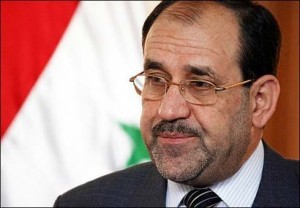A Referendum on Administration of Prime Minister Maliki
Friday, May 2nd, 2014 3:52:12 by Jamshed Sindhu
Today’s elections in Iraq have much of a referendum on the management of Prime Minister Nuri al-Maliki. After two terms as head of government, the political veteran aims for a third term. But eight years in office are also eight years of wear and figure, which initially attracted unanimity from U.S. and Iran, is now much more controversial. It has, though, with the absence of an opponent with enough support.
For Iraqis, as Washington and Tehran, the most important thing is stability. Al Maliki ‘s campaign has drawn on that goal (with exits to the street, timely broadcast on television). However, a return to levels of violence that the country lived since 2008 has undermined his message. Meanwhile, the government has discredited before the advance of Sunni insurgents increasingly near Baghdad, and Shiite militias revenge on the Sunni population, often in collusion with the security forces.
Al Maliki, 63, became prime minister in 2006, in part because it both Iran and the U.S. (with whom he collaborated after the demolition of Saddam) believed it would be malleable. But the discrete Dawa leader, known as Jawad during his years of exile in Syria and Iran would be revealed as an ambitious politician and ideas.
During his first term he fulfilled the commitment to halt the ” organized armed groups operating outside the law.” To his credit, not only faced Sunni insurgents, but also put an end to the Shiite militias that began to take the law into their own hands. In 2010, he also discussed the campaign with a non-sectarian discourse.
Now, however, he has no qualms in appearing as a defender of the Shia against Sunni extremists who have become strong in the province of Al Anbar. His promises of national unity have disappeared, while the concentration of power (accumulated portfolios of defense, interior and national security) not only earned him enemies among Sunni Arab and Kurdish leaders, but among his own community, Arab Shiite.
Even in the south, where most of the Shiite population is concentrated, there have recently been signs that your popularity begins to decrease. It has even received some criticism for its lack of Ayatollah progress in Al Anbar and corruption. Groups like Al or Al Ahrar Mutawin, bringing together political rivals could find an alternative candidate as it is not expected that any party to win a sufficient majority. However, their differences make consensus. In 2012, as a vote of confidence tried and failed. For many Iraqis, Al Maliki remains the ” least bad ” option.
Short URL: https://www.newspakistan.pk/?p=43494

















